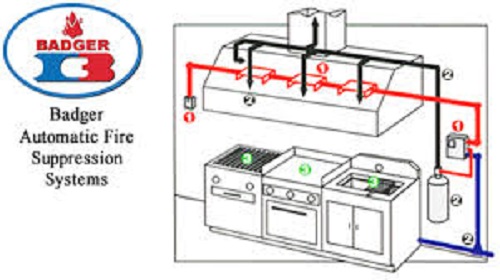


Kitchen Suppression Systems
The impact of fires in commercial kitchens can have a much greater impact than just the damage the fire itself can cause. The location of the kitchen – whether in a restaurant or commercial centre – can lead to both economic and reputational damage that can outweigh the impact of the fire damage.
Over the last twenty years, airports and shopping malls around the globe have had to deal with the impact of these typesof fires – fires that could, and possibly should, have been quickly and effectively extinguished - but instead led to significant financial cost and damaged the reputation of the wider commercial area.
Fast food outlets went through a period in the late ‘90’s of having fires that appeared to have originated in these restaurants.A fire at London’s Waterloo Railway Station followed fires at both Heathrow and Gatwick airports.
The Heathrow Airport fire, which broke out in the communal roof ducting that served a number of food outlets, took five hours to be extinguished.
The terminal was closed for ten hours, 300 flights were cancelled and an estimated 45,000 passengers were affected. The financial and reputational cost of such a fire is substantial.
A few months later, a deep fat fryer in a restaurant in Gatwick Airport also led to a smaller fire in the roof ducting system.
These incidents are still occurring.
In 2009, in Vilnius, Lithuania, a similar fire broke out in a restaurant in a shopping mall[2]. The fire started in a deep fat fryer in a restaurant in the Akropolis shopping mall. The fire got into the duct, which was coated in fat and spread through the duct into the main building, activating 19 sprinkler heads.3,000 people had to be evacuated and the cost to the mall, even after being able to open the next day, was approximately€150,000 ($207,000).
These few examples show how even a small fire in a restaurant or catering facility can have a much greater affect on the surrounding area than a similar fire in a home or high street.
Kitchens are environments with significant sources of fuel and heat with a ready supply of oxygen. Not only with gas supplies and naked flames but also extractor hoods and ducts and grease filters potentially covered in material that will fuel a fire.
Such risks should be managed by a combination of approaches including – making sure the kitchen is cleaned regularly and effectively, effective management and training of staff, ensuring that fire blankets and extinguishers are readily availableand through the installation of fixed suppression systems.
These systems are pre-engineered and typically installed above the cooking areas to prevent a fire entering the duct and also to put the fire out at its source.
It is very important to select and install a fixed suppression system that performs effectively in the event of a fire.
LPCB, part of BRE Global, has over 100 years experience working with industry, regulators and insurers setting the standards for evaluating the performance of fire protection and security products.
LPS 1223sets out the requirements and testing procedures for LPCB (Loss Prevention Certification Board) certification and listing of fixed fire extinguishing systems for catering equipment.
To meet LPS 1223, the suppression systems have to protect the extraction system and cooking appliances by detectingand extinguishing fires in both the cooking appliance and within the extractor hood. In addition the extinguishing systems need to isolate the cooking units and provide a signal to the fire alarm system to annunciate the event. Both manual and automaticactivation of the systems is also required.
Another key design requirement for these systems is the need to protect the discharge nozzles from the build-up of cooking deposits such as fat to ensure they continue to operate correctly.
It is also the responsibility of the system’s supplier to ensure the design and installation of the system is carried out by authorised agents and that they carry out the work in accordance with the manufacturer’s requirements.
The cost effectiveness of fitting a suppression system in professional kitchens is self evident. Not only do they reduce risk to staff and patrons alike, they also reduce the risk to the property, business operation and wider environment where the kitchen is based. It would seem appropriate for any large mall, transport hub or commercial plant to require LPS1223 compliant fire suppression systems to be installed in all restaurants that operate on site.
More information on LPS 1223 can be found in the Red Book. As with all LPCB approved fire safety and security products, they arelisted in the Red Book, which is published annually, updated daily and available online at www.redbooklive.comThe Red Book is also available as a freely downloadable App (LPCB Redbook) from iTunesand Google Play. The Red Book has become the de-facto directory of approved and trusted fire and security products and servicesand used across the world.
http://www.catererandhotelkeeper.co.uk/articles/19/2/1998/11627/fires-come-in-threes-at-burger-king.htm
http://www.thebigredguide.com/news/fire-sprinklers-save-shopping-mall-in-vilnius-lithuania.html
Recent Posts
Gunnebo has launched Grenoz® 1230: A Revolutionar...
Product Launch
Grenoz® 1230: A Revolutionary Clean and Green Fire Extinguishing Agent which is Specially Designed for protecting lives with a commitment towards sustainable f...
Fire Protection Storage Tanks: It’s Benefits &am...
Fire Protection Storage Tanks: It’s Benefits & Significance
Fire incident takes place without warning. Sometimes it spreads so quickly that it gives no time to call for help or react.
To have fire pro...
New construction, retro-fitting projects and day-t...
New construction, retro-fitting projects and day-to-day operations: new GEZE website provides support throughout the building life cycle
Clearly structured and quick and easy to use – the new GEZE India/ GEZE Gmbh ...
Monsher is authorized distributor for BlazeMaster
CAN HDPE PIPES BE USED FOR FIRE WATER UNDERGROUND ...
Contributed By: Babanna Biradar, PE, CFPS, FSE (TUV) and Vivek Dhingra
ABSTRACT

